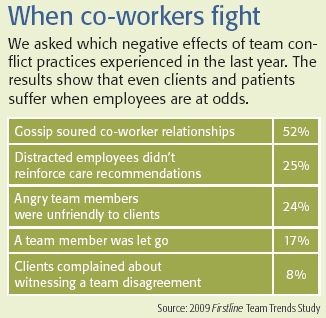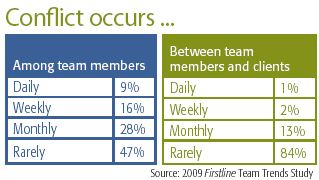The cost of clashing
Conflict happens-and that's OK. But if it's not handled correctly, people and pets suffer.
Disagreements themselves aren't a problem, says Dr. Carin Smith, owner of Smith Veterinary Consulting and Publishing in Peshastin, Wash., and author of Team Satisfaction Pays. "Great teams have conflict because individuals all contribute different ideas and draw from different experiences," she says. "The challenge is in how the team manages those differences."

The best way: Plan ahead. But only 44 percent of practices have a protocol for dealing with team conflict, according to our survey. "Without a protocol, we tend to approach conflict on a case-by-case basis where details might overwhelm the bigger picture," Dr. Smith says. "Conflict is inevitable, but if a team talks about conflict before it happens, they can become more proactive in dealing with it."

The same goes for discord with clients. You must develop a system for addressing it, because reacting to client problems rather than anticipating them means situations are more likely to escalate. This creates a negative cascade effect. "When people are concentrating on a conflict, there's loss of productivity, decreased client satisfaction and, ultimately, pet care suffers," Dr. Smith says.
Resolve and conquer
If your practices is without a team- or client-conflict resolution plan, it's time to get busy writing. Here's how to start:
1. Involve everyone. "No one person should create a protocol related to conflict," Dr. Smith says. "The team should."
2. Make an agenda. If you're the manager, add the development of a protocol to the to-do list for your next team meeting. Not the manager? Request that the topic be covered soon.
3. Keep it impersonal. Start the team-wide discussion with client conflict, says Dr. Smith. This feels less awkward than the topic of team arguments. Begin with this question: "Can we discuss conflict in a general sense? That is, does everyone know what to do and how to respond when clients express anger, frustration, or other strong feelings?" With this opener, employees will likely raise other conflict-related issues your team needs to address.
